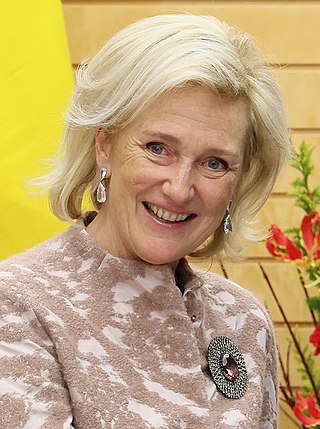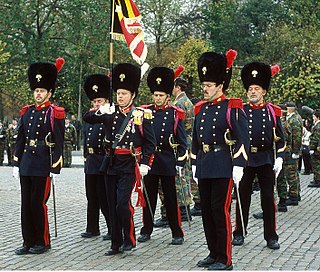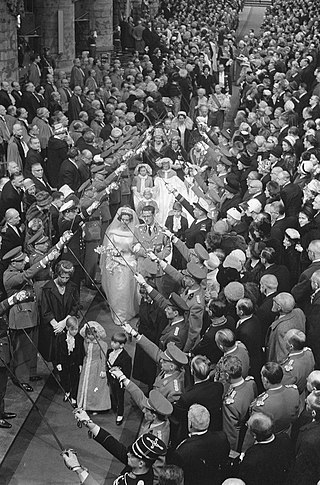
Baudouin was King of the Belgians from 17 July 1951 until his death in 1993. He was the last Belgian king to be sovereign of the Congo, before it became independent in 1960 and became the Democratic Republic of the Congo.

The monarchy of Belgium is the constitutional and hereditary institution of the monarchical head of state of Belgium. As a popular monarchy, the Belgian monarch uses the title king/queen of the Belgians and serves as the country's head of state and commander-in-chief of the Belgian Armed Forces.

Albert II is a member of the Belgian royal family who reigned as King of the Belgians from 9 August 1993 until his abdication on 21 July 2013.

Astrid of Sweden was a member of the Swedish House of Bernadotte and later became Queen of the Belgians as the first wife of King Leopold III. Following her marriage to Leopold in November 1926, she assumed the title of Duchess of Brabant. Astrid held the position of Queen of the Belgians from 23 February 1934 until her death in 1935. Known for her charitable efforts, she focused particularly on causes related to women and children.

Princess Astrid of Belgium, Archduchess of Austria-Este, is the second child and first daughter of King Albert II and Queen Paola, and the younger sister to the current Belgian monarch, King Philippe. She is married to Prince Lorenz of Belgium, head of the Austria-Este branch of the House of Habsburg-Lorraine, and is fifth in line of succession to the Belgian throne.

Fabiola Fernanda María-de-las-Victorias Antonia Adelaida de Mora y Aragón was Queen of the Belgians as the wife of King Baudouin from their marriage in 1960 until his death in 1993. The couple had no children, as all five of Fabiola's pregnancies resulted in miscarriage, so the Crown passed to her husband's younger brother, King Albert II.

Jean Luc Joseph Marie "Jean-Luc" Dehaene was a Belgian politician who served as the prime minister of Belgium from 1992 until 1999. During his political career, he was nicknamed "The Plumber", as well as "The Minesweeper", for his ability to negotiate political deadlocks.

Princess Margaretha of Sweden was a member of the Swedish Royal Family by birth and the Danish Royal Family by marriage. She was the elder sister of Crown Princess Märtha of Norway and Queen Astrid of the Belgians.

Princess Märtha of Sweden was Crown Princess of Norway as the spouse of the future King Olav V from 1929 until her death in 1954. As Olav only became king in 1957, Märtha never became Queen of Norway. Her son, Harald V, is the current king of Norway. Princess Märtha was also an elder sister of Queen Astrid of Belgium and a maternal aunt of Grand Duchess Joséphine-Charlotte of Luxembourg and Kings Baudouin and Albert II of Belgium.

Elisabeth of Bavaria was Queen of the Belgians from 23 December 1909 to 17 February 1934 as the wife of King Albert I, and a duchess in Bavaria by birth. She was the mother of King Leopold III of Belgium and of Queen Marie-José of Italy, and grandmother of kings Baudouin and Albert II of Belgium, and Grand Duchess Joséphine-Charlotte of Luxembourg.

The King Baudouin Foundation (KBF) is a foundation based in Brussels (Belgium). It seeks to change society for the better and invests in inspiring projects and individuals.

Princess Marie-Esméralda of Belgium, Lady Moncada, is a member of the Belgian royal family. She is the half-aunt of King Philippe of Belgium and Henri, Grand Duke of Luxembourg. Princess Marie-Esméralda is a journalist, author, documentary-maker, environmental activist and a campaigner for the rights of women and indigenous people.

Thomas Leysen is a Belgian entrepreneur who graduated from the Katholieke Universiteit Leuven with a degree in law.
The Queen Elisabeth Medical Foundation (QEMF) is a Belgian non-profit organization, founded in 1926 by Elisabeth of Bavaria, wife of Albert I. She founded the organization, based on her experience with the wounded from the front-line during the First World War. The foundation wants to encourage laboratory research and contacts between researchers and clinical practitioners, with a particular focus on neurosciences. The QEMF supports seventeen university teams throughout Belgium.

The Regiment Carabiniers Prins Boudewijn – Grenadiers is an infantry regiment in the Land Component of the Belgian Armed Forces. The regiment is a part of the Motorized Brigade. This regiment is a Dutch speaking unit.
The Hague Club is formed by the Chief Executives of 30 major foundations and philanthropic organizations in Europe and corresponding members from the USA, Asia and Australia. It meets once a year to discuss informally the role of philanthropy and management of foundations. Founded in 1971, it claims to be independent of governments and to have no political aims.
Michel, Count Didisheim was the private secretary and chief of the Royal household (1962–1986) of Albert, Prince of Liège, later to become king Albert II of Belgium. He was also the CEO and president of the King Baudouin Foundation (1976–2001).

Princess Joséphine-Charlotte of Belgium was the Grand Duchess of Luxembourg as the wife of Grand Duke Jean. She was the first child of King Leopold III of Belgium, and sister of the late King Baudouin and former King Albert II and aunt of King Philippe. She was also the maternal first cousin of King Harald V of Norway, paternal second cousin of Queen Margrethe II of Denmark, and a paternal third cousin of Queen Elizabeth II of the United Kingdom.

The Royal Olivaint Conference of Belgium NPO is a Belgian independent, multilingual leadership organisation and debating union and honor society for students founded in 1954. It is the only student organisation in Belgium operating in both official languages. The slogan of the association is 'Teaching governance today, growing leaders for tomorrow'. Its aim is to educate its members for public life. Its focus is on training in public speaking, debating, writing and leading conferences with top politicians, academics and business executives. The Olivaint Conference of Belgium was founded on the model of the Conférence Olivaint in France. Candidate members must submit a written application and undergo an interview by the Conference's board of directors. The Conference limit its membership to 50 persons per academic term. Membership is limited to two years. Characteristic of the association is that the male members wear an 'Olivaint tie' with the society's logo during activities.

The wedding of King Baudouin of Belgium, and Doña Fabiola de Mora y Aragón took place on Thursday, 15 December 1960. The couple was married first in a civil ceremony held in the Throne Room of the Royal Palace of Brussels and then in a Roman Catholic ceremony at the Cathedral of St. Michael and St. Gudula.
















